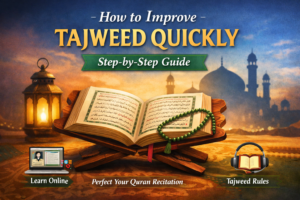Fusha Arabic is the formal and standardized variety of Arabic that serves as a lingua franca for formal communication and education across the Arab world. Learning Fusha Arabic means that you need to know how to read, write, and speak in a formal form. The language has three types which are: Classical Arabic, Modern Standard Arabic, and Colloquial Arabic.
Once you have decided to learn Fusha Arabic, you either start with Classical or Modern Standard Arabic as they are the forms that Arabs use in official writing and speaking.
Colloquial Arabic or slang is an informal type that varies from one Arab country to another.
Choosing between two formal types of Arabic relies on your purpose of learning. In this article, we’ll walk you through the tips for learning Fusha.
Table of Contents
What is Fusha?
“Fusha” or “Fuṣḥā” (فصحى) is an Arabic (singular) articulate feminine that refers to Classical Arabic as the language of the Qur’an and Arabic literature. Fusha means the pure and the thing that is free of all defects, and is not mixed with other external elements.
“Fusha” is also an Arabic term that refers to Modern Standard Arabic (MSA). Fusha is the linguistic norm that allows communication between speakers of various regional dialects, which can differ significantly in pronunciation, vocabulary, and grammar.
What is Fusha Arabic?
Fusha Arabic (العربية الفصحى) is the formal type of language that includes Classical and Modern Standard Arabic. Beginners should begin with Arabic basics to be familiar with the language in writing, reading, and speaking.
Unlike the various spoken Arabic dialects, Fusha Arabic maintains a high level of mutual intelligibility among Arabic speakers. It is based on the classical Arabic of the Quran and classical literature and has been adapted to suit modern communication needs. Fusha is the version of Arabic taught in schools and universities and is used in official government documents, international conferences, and media broadcasts.
Online educational resources are indispensable to improve linguistic skills such as Arabic-English dictionaries, news websites, and learning Apps. Attending an online course is one of the best and most effective methods to learn Fusha.
Every grammatical language is subject to the rules of morphology, grammar, and the origins of linguistic structure. Fusha is the language of literature, science, media, prayer, and so on. And its opposite is the “colloquial language”, which is the spoken language.
While Fusha serves as a unifying and standardizing form of Arabic, it is important to note that it is not the language of daily conversation for most Arabic speakers. People in different Arab countries typically speak their regional dialects for everyday communication, but they switch to Fusha when engaging in more formal or official settings.
How to Learn Fusha Arabic?
What matters to non-Arabs who are interested in Arabic is the learning method from scratch. It’s one of the hardest languages to learn. Here are the practical tips for learning Arabic for beginners:
1. Learn Arabic Basics
At the elementary level, you should start with learning the language fundamentals. So, begin with the Arabic Alphabet, identify each sound of every letter, and practice pronouncing.
Moreover, learn how to write letters from right to left and differentiate between similar letters.
Learning the Arabic Alphabet requires knowing the different forms of letters, which are the beginning, the middle, and the end.
Arabic basics include learning primary words that Arab use formally. You should master greeting, thanking, and further basic phrases that you’ll use in conversations.
2. The Way You Master basic Arabic grammar
Arabic grammar is inevitably crucial and fundamental as you learn how to say basic Arabic phrases with correct grammar.
Arabic is rich in grammatical rules, but the most prominent grammatical basics are:
- Nouns, verbs, and particles.
- Nominal sentences.
- Verbal sentences.
- Singular and plural.
- Adjectives and adverbs.
- Arabic Numbers.
- Genitive cases.
3. The Type Of Arabic Dictionary You Depend On
Learning a new language means using translation to comprehend the words’ meanings in English. So you can use an online dictionary that helps you grasp and retain new Arabic words.
For instance, one of the best Arabic-English dictionaries is the Almaany dictionary which displays the word’s translation and examples of it in different phrases.
4. Learn how to read Arabic News
If you want to be familiar with Fusha Arabic phrases, you should read Arabic news as much as you can. This tip is effective to learn different words in various fields and develop reading skills.
You can read the Middle East and All the world news through online websites such as Al-Arabiya, BBC Arabic, RT Arabic, and CNN Arabic.
5. The Type of Arabic Audio You Listening to
Arabic learning should be for improving all linguistic skills, so besides reading, you have to focus on listening to Arabic natives who speak Fusha Arabic.
It’s recommended to listen to Arabic broadcasting on TV and Radio. This tip will help you to sharpen your speaking skills if you do it constantly.
6. Arabic Documentaries
You can watch a documentary film with Fusha voice-over and English subtitles. Try to find content that interests you to watch it fully.
7. How to Never stop Practicing
If you want to level up in learning Arabic, you should practice all the skills to reach a stage where you can write, read, and speak in Arabic fluently.
While you learn Arabic, you’ll notice many mistakes you make in pronunciation, grammar, writing, and so on. So select your weaknesses and work hard on them to master all the skills.
8. Make a daily schedule
Set a time that ranges from 15 minutes to one hour for learning and revising in your day. Try to manage other tasks and responsibilities to find an available period every day.
Which Arabic Dialect Is Closest to Fusha?
The Arabic dialect closest to Fusha, also known as Modern Standard Arabic (MSA), is often considered to be the Levantine dialect, particularly that spoken in the region encompassing Syria, Lebanon, Jordan, and Palestine.
Among these, the dialect spoken in Syria is frequently highlighted due to its relatively clear pronunciation and lexical similarities with Fusha. Levantine Arabic preserves many classical elements and structures, making it somewhat easier for speakers of Fusha to understand and learn compared to other dialects, such as Egyptian or Maghrebi Arabic.
Tips on How to Learn Arabic Fusha:
Fusha serves as a unifying linguistic standard across the diverse Arabic-speaking world, allowing for mutual understanding despite the various regional dialects. Some tips on how to learn it are:
1- Immerse Yourself in Arabic Media:
Watch Arabic news channels, read newspapers, and listen to radio stations that use Fusha. Al Jazeera and Al Arabiya are good examples of news channels that use Modern Standard Arabic.
2- Take Formal Classes:
Enroll in courses at language schools or online platforms that specialize in teaching Arabic. Structured learning with a curriculum can significantly aid in mastering the language.
3- Use Language Learning Apps:
Applications like Duolingo, Rosetta Stone, and Memrise offer comprehensive Arabic courses that cover reading, writing, speaking, and listening.
4- Practice Reading:
Read books, articles, and other written materials in Fusha. Start with simpler texts like children’s books and gradually move to more complex literature and academic papers.
5- Write Regularly:
Practice writing essays, diary entries, or even social media posts in Fusha. This helps reinforce grammar and vocabulary.
6- Engage in Conversation:
Find language exchange partners or join online forums where Fusha is used. Speaking and listening are crucial for fluency.
7- Learn Arabic Grammar:
Understanding the rules of Arabic grammar is essential for mastering Fusha. There are many grammar books and online resources available.
8- Use Flashcards for Vocabulary:
Tools like Anki can help you memorize new words and phrases through spaced repetition.
9- Hire a Tutor:
A private tutor can provide personalized instruction and feedback, helping you to address specific challenges.
10- Stay Consistent:
Daily practice, even if it’s just for a short period, is more effective than sporadic, intensive sessions.
Where Is Fusha Arabic Spoken?
Fusha, or Modern Standard Arabic, is not typically spoken in everyday conversations but is widely used in formal settings across the Arab world. It is the official language of 22 countries in the Arab League and is used in:
1- Media:
Television news, radio broadcasts, newspapers, and magazines across the Middle East and North Africa predominantly use Fusha.
2- Education:
Schools and universities teach in Fusha, especially in subjects like literature, history, and religious studies.
3- Government and Official Documents:
Laws, official communications, and governmental publications are written in Fusha.
4- Religious Contexts:
The Quran is written in Classical Arabic, which is very close to Fusha. Religious sermons and texts are also often in Fusha.
5- International Communication:
Diplomatic and official communications between Arabic-speaking countries are typically conducted in Fusha.
Do Arabs Speak Fusha With Accent?
Arabs don’t speak Fusha in their daily dealings. They talk in Colloquial Arabic in different situations and places.
Some categories speak Fusha Arabic such as new settler anchors, preachers, and Quranic reciters. Moreover, Arabs use Fusha in official documents and speeches.
How Do You Say Numbers In Fusha Arabic?
Numbers are one of the basics you should include in learning Arabic. You can identify how to pronounce them in Fusha form:
0 = صفر (sifr).
1 = واحد (wahid).
2 = إثنان (itnan).
3 = ثلاثة (talata).
4 = أربعة (arba’a).
5 = خمسة (ḫamsa).
6 = ستة (sitta).
7 = سبعة (sab’a).
8 = ثمانية (ṯamāniya).
9 = تسعة (tis’a).
10 = عشرة (‘ashra’).
11 = إحدى عشرة (aḥada ‘sshar).
12 = إثنى عشرة (Iṯnā ‘Ashar).
13= ثلاثة عشر (tālatha ‘ashar).
14 = أربعة عشر (arba’a ‘ashar).
15= خمسة عشر (ḫamsa ‘ashar).
16= ستة عشر (sitta ‘ashar).
17= سبعة عشر (sab’a ‘ashar).
18= ثمانية عشر (ṯamāniya ‘ashar).
19= تسعة عشر (tis’a ‘ashar).
20= عشرون (‘ishrun).
How Long Does It Take to Learn Fusha Arabic?
The time it takes to learn Fusha Arabic (Modern Standard Arabic) can vary widely based on several factors, including the learner’s language background, the amount of time dedicated to study, and the learning methods used.
Generally, the Foreign Service Institute (FSI) classifies Arabic as a Category IV language, meaning it is considered one of the more challenging languages for English speakers to learn.
1- Basic Proficiency:
Achieving a basic level of proficiency, where one can understand and use common expressions and simple sentences, typically requires about 600-700 hours of study.
2- Intermediate Proficiency:
Reaching an intermediate level, where one can handle more complex conversations and understand the gist of news articles or simple literature, usually takes around 1100-1200 hours.
3- Advanced Proficiency:
For advanced proficiency, where one can read and understand sophisticated texts, participate in detailed conversations, and write coherently on various topics, it might take approximately 2200 hours of study.
How to Master Fusha Arabic?
1- Intensive Study Program:
Enroll in an intensive Arabic course, either online or at a language institute, which provides structured and immersive learning.
2- Daily Practice:
Dedicate time each day to practice reading, writing, speaking, and listening in Fusha. Consistency is key.
3- Arabic Media Consumption:
Regularly watch news channels, listen to radio broadcasts, and read newspapers and books in Fusha to get accustomed to its use in different contexts.
4- Engage in Conversation:
Participate in language exchange programs, join Arabic-speaking clubs, or find conversation partners who can help you practice speaking and listening.
5- Grammar and Vocabulary:
Focus on mastering Arabic grammar rules and expanding your vocabulary through the use of textbooks, flashcards, and language apps.
6- Hire a Tutor:
Consider hiring a private tutor who can provide personalized guidance, address your specific learning needs, and help you stay motivated.
7- Writing Practice:
Write essays, journal entries, or even social media posts in Fusha to improve your writing skills and reinforce what you’ve learned.
8- Cultural Immersion:
If possible, travel to an Arabic-speaking country and immerse yourself in the language and culture, which can greatly enhance your learning experience.
Is Modern Standard Arabic the Same as Fusha?
Yes, Modern Standard Arabic (MSA) and Fusha are essentially the same. Both terms refer to the standardized and literary form of Arabic used across the Arabic-speaking world for formal communication, literature, media, education, and official documents.
1- Fusha:
This term, which means “eloquent” in Arabic, is often used to refer to the high literary and formal register of the language, which includes both Classical Arabic (used in the Quran and early Islamic texts) and Modern Standard Arabic.
2- Modern Standard Arabic (MSA):
This is the contemporary form of Fusha used in modern writing, media, and formal speech. While it is based on Classical Arabic, it has evolved to include modern vocabulary and expressions to address contemporary issues and concepts.
Other courses you could be interested in:
- Learn Quran Online With Tajweed For Kids And Adults
- Best Arabic Online Course
- Islamic Studies Online Courses
- Best Noorani Qaida Online Course
Is the Quran Arabic Fusha?
Quranic Arabic is one of the most prominent examples of Fusha. It’s a Classical Arabic form that represents the old version of the language. Quran’s writing was in the 6th century A.D.
Quranic Arabic is a fundamental source of learning Classical or Fusha Arabic. It’s related to medieval dialects that Arab tributes spoke.
Although both Quranic Arabic (classical) and Modern Standard Arabic are Fusha, they are not the same in punctuation and grammar.
If you’re proficient in Fusha Arabic, you will manage to read Quranic verses but not correctly. You’re missing learning Tajweed rules to read the Quran fluently, besides being familiar with Quranic words that are complicated to pronounce.
It’s noteworthy that Modern Standard Arabic is the current formal type that is common in Arabic Media, formal speeches, books and formal documents.
What Is Fusha vs Masri Arabic Grammar?
Fusha, or Modern Standard Arabic (MSA), has a highly structured grammar with complex inflections. It uses Verb-Subject-Object (VSO) and Subject-Verb-Object (SVO) word orders. Pronouns include singular, dual, and plural forms, distinguishing between masculine and feminine.
Verbs conjugate for tense, mood, and voice, matching the subject in person, number, and gender. Nouns, pronouns, and adjectives inflect for case and definiteness, marked by “ال” (al-) for definite nouns and “ً” (tanween) for indefinite nouns. Adjectives agree with nouns in gender, number, case, and definiteness.
Masri, or Egyptian Arabic, has a simpler grammar. It primarily uses SVO word order and flexible sentence structures. Pronouns are streamlined, with no dual forms and fewer gender distinctions in the plural.
Verb conjugation is straightforward, using prefixes for the present tense and fewer forms overall. Egyptian Arabic lacks case endings, simplifying noun and pronoun use. The definite article “ال” (al-) is used similarly, but indefinite nouns have no special endings. Adjectives agree with nouns in gender and number without inflecting for case.
Which Countries Speak Fusha Arabic?
Fusha Arabic, or Modern Standard Arabic, is not spoken as a native language but is widely used in formal settings across the Arab world. It serves as the official language in all 22 member countries of the Arab League.
These countries include Algeria, Bahrain, Comoros, Djibouti, Egypt, Iraq, Jordan, Kuwait, Lebanon, Libya, Mauritania, Morocco, Oman, Palestine, Qatar, Saudi Arabia, Somalia, Sudan, Syria, Tunisia, the United Arab Emirates, and Yemen.
In these countries, Fusha is used in government, media, education, and literature, providing a unifying linguistic standard across the diverse Arabic-speaking regions.
Who Speaks Fusha Arabic?
Fusha Arabic is spoken by educated individuals across the Arab world, particularly those who have gone through formal education systems where it is taught. Essentially, anyone involved in formal or academic activities in the Arab world is likely to use and understand Fusha Arabic.
1- Journalists and Broadcasters:
Journalists and broadcasters frequently use Fusha for formal communication and news broadcasts, ensuring that their content is understood by audiences from various regions.
2- Government Officials:
Government officials use Fusha in official documents, speeches, and legal proceedings, while writers and academics write and publish their work in this standard form of Arabic.
3- Religious Leaders:
Religious leaders also use Fusha in sermons and religious texts, as it is the language of the Quran and classical Islamic scholarship.
Why Are Arabic Subtitles in Fusha?
Arabic subtitles are typically in Fusha to ensure standardization and comprehensibility across the diverse Arabic-speaking regions. Fusha serves as a common linguistic standard that educated individuals throughout the Arab world can understand, regardless of their regional dialects. Its formal and precise nature makes it suitable for written text and official communication.
Since Fusha is taught in schools and used in formal education, it is familiar to literate audiences. Using Fusha in subtitles also avoids dialectal bias, ensuring that no single regional dialect is favored, which could alienate parts of the audience.
Additionally, for translation and dubbing, using Fusha ensures consistency and matches the formal nature of subtitles in other languages, making it the preferred choice for Arabic subtitles in media.
Learn Fusha Arabic – Arabic Learning App
Through mastering the Arabic journey, you’ll need more online resources to support learning. Here are the best apps that are available on Android and IOS phones:
- BravoBravo.
- Arabic Alphabet.
- I Read Arabic.
- Duolingo.
- English Arabic Dictionary.
- Drops Learn Arabic.
- Memrise.
- Simply Learn Arabic.
- Mondly.
- Learn Languages.
Learn Arabic Online With Bayan al-Quran Native Arab Tutors:
Embark on a transformative journey of Arabic learning with Bayan Al-Quran’s comprehensive online Arabic courses. Our platform offers an authentic and immersive experience tailored to learners worldwide. Whether you’re a beginner or seeking to enhance your skills, our Tajweed courses provide expert guidance and structured learning to master Arabic learning.
🎓 Expert Guidance:
Benefit from experienced instructors who specialize in Arabic, breaking down complex rules into manageable segments for learners of all levels.
✨ Key Features:
- Structured, step-by-step learning approach.
- Access to high-quality instructional materials.
- Real-time feedback from qualified tutors to enhance your practice.
- Flexible learning schedules to accommodate your pace and convenience.
- Immerse yourself in the melodious tones of Quranic recitation, enriching your spiritual experience.
🌟 Why Choose Bayan Al-Quran?
Join our vibrant community dedicated to perfecting Arabic learning. Choose Bayan Al-Quran for a transformative learning experience and embark on a path to mastering Arabic with confidence.
Learn with Bayan al-Quran with Native Arab tutors. There are also several courses that can help you in this regard.
Conclusion:
Fusha Arabic, encompassing both Classical and Modern Standard Arabic, serves as the formal written and spoken form of Arabic used in literature, official documents, media, and education. Derived from the classical Arabic of the Quran, Fusha provides a high level of mutual intelligibility across the Arabic-speaking world, despite the prevalence of regional dialects in daily conversation.
Learning Fusha involves mastering the Arabic alphabet, basic grammar, and common phrases, supported by resources like Arabic-English dictionaries, news websites, and educational apps. Practical tips include reading news in Arabic, listening to Arabic broadcasts, and regular practice.
While Quranic Arabic is a classical form of Fusha, proficiency in Modern Standard Arabic does not automatically equate to fluency in reading the Quran without additional study of Tajweed rules.
















